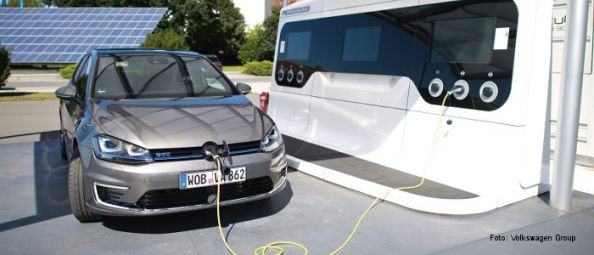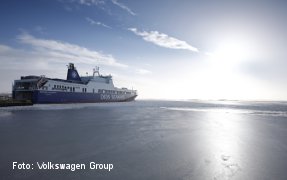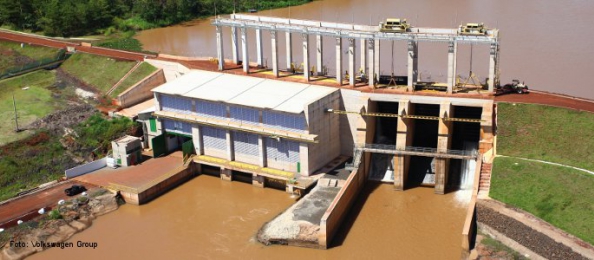Volkswagen’s Role in Germany’s Energiewende
The Volkswagen Group has set the goal of becoming the most sustainable car manufacturer in the world by 2018. Germany’s Energiewende (energy transition or revolution) sets a framework for this.
Lasting success stories require a high level of commitment from all those involved. Numerous players have to work together from the initial idea to concrete measures and their constant implementation. A vision can become reality in this way. Germany’s energy transition stands for this kind of vision. Being one of the largest German industrial companies, Volkswagen is one of the key -actors. Sustained development is a project that politics, industry, and society can only achieve together. The transition to sustainability cannot work without the companies support – their innovative force and their investment power of companies.
Today, the automotive industry in Germany and Europe is already a powerful engine for ecological innovation. No other company in the automotive industry invests more in the development of new, efficient technologies than Volkswagen. Once having been “just” a carmaker, the 12-brand group now delivers diverse solutions for a future integrated energy and mobility architecture. From increasing energy efficiency to developing decentralized supply structures such as combined heat and power plants, as well as expanding renewable energy of its own accord, Volkswagen is involved in all of these fields in addition to developing and marketing innovative hybrid and electric vehicles.
In 2018, the Volkswagen Group intends to be the world’s leading car manufacturer, both financially and ecologically. This will be not just in terms of vehicles and business figures, but also in terms of commitments regarding climate protection, saving resources, and energy efficiency. To achieve this target, ambitious aims were set: 25 percent less energy and water consumption; 25 percent fewer CO2 emissions, solvent emissions, and production waste per vehicle compared with 2010. In addition, the CO2 emissions in the energy supply to the production sites in Germany should be cut by 40 percent by 2020. Cars themselves will become more efficient and environmentally friendly, too: the Volkswagen Group is the first car manufacturer to set the goal of cutting CO2 emissions of the European new car fleet to 95 grams per kilometer by 2020.

Increasing energy efficiency
We can save energy by avoiding its usage or by developing methods and technologies that help us use energy more effectively. Energy-saving measures will not just lower costs in many areas but will also protect resources and contribute toward reducing CO2 emissions. Unless energy efficiency is noticeably increased, global climate protection aims will be virtually impossible to reach. For Volkswagen, measures to use energy more effectively are an important factor in reaching our own product and production goals.
In its environmental strategy, the Volkswagen Group has committed itself to making each new Volkswagen Group vehicle model better in terms of environmental characteristics and, above all, more efficient than the previous model. Efficiency, weight reduction, and lowering of air resistance are key elements. The fact that energy efficiency is the central theme of the product policy is also reflected in the development and marketing of alternative drive technologies such as compressed natural gas and electric mobility.
In production, the Volkswagen brand has directly linked these goals with its “Think Blue. Factory.” initiative for greater ecological sustainability. The cross-segment and cross-brand introduction of the modular transverse toolkit has brought about optimized production, and thus more energy-efficient procedures. Moreover, Volkswagen is counteracting high-energy consumption in factory halls and office buildings by implementing efficiency measures in building construction and management. Also, staff awareness about the careful usage of energy and the motivation to participate is being raised through a supply of information as well as campaigns.
Decentralized supply structures
The decentralized generation, storage, and distribution of energy is a key component of future energy systems – not just since the Energiewende and not just in Germany. According to the International Energy Agency, the worldwide demand for electrical energy will rise well over 60 percent by 2035, compared with 2011. About half of this will be electricity from renewable energy sources – and a large part will be generated through decentralized means.
The Volkswagen Group is already setting up decentralized structures for its own energy supply. Furthermore, Volkswagen is developing solutions for industry and consumers. It is also researching flexible storage concepts to compensate for fluctuations in electricity networks.

The Power Engineering solutions from MAN are one example of this. They are in demand both nationally and internationally. In addition to industrial sites, MAN Diesel & Turbo also supplies remote regions far from any grid infrastructure with the necessary power station technology for the decentralized generation of energy. In Turkey, for example, the company has provided floating power stations that supply whole towns near the coast with power in a collaboration with partners. The setup of decentralized supply structures also involves the development of storage concepts that compensate for the fluctuating availability of regenerative energy. To this aim, Volkswagen is researching ways to convert electricity from regenerative primary energy into synthetic methane that is stored in the gas network and can be converted back into electricity when required. It is also looking at using electric vehicles as intermediate storage for surplus electricity in the network. Being much more concrete than a pure vision of environmentally-friendly niche technologies, these solutions represent an important element in the setup of a functioning, decentralized energy system. In addition to the supplies’ reliability, these solutions could also represent a financial incentive for vehicle owners as electric vehicles are incorporated into the electricity market.
| Initiator | Volkswagen Group |
| Project start | |
| Status | Ongoing |
| Region | Worldwide |
| Contact person | Daniela Blaschke |
| Awards |
| Anti-Corruption | - |
| Business & Peace | - |
| Development | - |
| Environment | X |
| Financial Markets | - |
| Implementing UNGC Principles in your Corporate CSR Management | - |
| Human Rights | - |
| Labour Standards | - |
| Local Networks | - |
| Advocacy of global issues | X |
| Business opportunities in low income communities/countries | - |
| Project funding | - |
| Provision of goods | - |
| Provision of services/personal | - |
| Standards and guidelines development | X |
Regenerative energy sources
The expansion of regenerative energy sources – the basic idea behind Germany’s energy transition – affects the Volkswagen Group in two ways: as a power supplier and consumer, and as a researcher and developer of alternative drives, alternative fuels, and innovative storage concepts. The Group is developing the sources itself – whether water or wind power, biomass or photovoltaic. To mention three examples: at the Emden site (Germany), Volkswagen opened up the world’s largest near-surface geothermal field in 2013; in Chattanooga (USA), it has commissioned the world’s largest solar power station belonging to a car manufacturer; and in Martorell (near Barcelona, Spain), it built the largest rooftop solar park in the automotive industry in November 2013. Furthermore, production sites all over the world also cover their energy requirements specifically with green electricity. In 2015, one-third of the electricity consumed by Volkswagen across the world already originates from regenerative sources.
The Group is not just investing in existing technologies for producing regenerative energy – it also develops and sells theseis technologies. For example, the turbine for the world’s largest solar power station in Abu Dhabi, which covers the same area as about 285 football pitchesfields, originates from the Group’s MAN brand.
On the road to market leadership, the Volkswagen Group also invests large sums in the development and marketing of innovative hybrid and electric vehicles. The fact is that electric mobility based on green electricity is one of the central requirements for the transition to a post-fossil fuel economy. Nevertheless, it can be assumed that mobility needs and transport tasks cannot be fulfilled with battery or fuel-cell vehicles in the foreseeable future. Air transport, road freight, and long-distance car mobility are still reliant on liquid or gaseous fuels. In this area too, Volkswagen, Audi, and MAN are involved in numerous research partnerships and alliances with universities, other scientific institutions, and biotechnology companies all over the world, with the aim of producing low- and zero-carbon fuels.
All the above examples clearly show that the Volkswagen Group and its 12 brands are pursuing concrete and ambitious aims. Defining the objective is only half of the job, however. Successful implementation is what counts in the end. The Volkswagen Group is working at full steam on its very own efficiency revolution – and is thus also contributing to the success of the project of the century: Germany’s Energiewende.
Daniela Blascke works in the department for political communication at Volkswagen Group.
Frank Hasenfuss works in the department for political communication at Volkswagen Group.
The Volkswagen Group with its headquarters in Wolfsburg is one of the world’s leading automobile manufacturers and the largest carmaker in Europe. In 2011, the Group increased the number of vehicles delivered to customers to 8.265 million, corresponding to a 12.3 percent share of the world passenger car market. The Group is made up of ten brands from seven European countries: Volkswagen, Audi, SEAT, ŠKODA, Bentley, Bugatti, Lamborghini, Volkswagen Commercial Vehicles, Scania and MAN.
Each brand has its own character and operates as an independent entity on the market. The product spectrum extends from low-consumption small cars to luxury class vehicles. In the commercial vehicle sector, the product offering ranges from pick-ups to buses and heavy trucks.
The Volkswagen Group is also active in other fields of business, manufacturing large-bore diesel engines for marine and stationary applications (turnkey power plants), turbochargers, turbomachinery (steam and gas turbines), compressors and chemical reactors, and also producing vehicle transmissions, special gear units for wind turbines, slide bearings and couplings as well as testing systems for the mobility sector.
Write a comment about this page
Your comments are provided by your own free will and you take sole responsibility for any direct or indirect liability. In order to maintain the highest discussion quality, all comments will be reviewed by our editors. You hereby provide us with an irrevocable, unlimited, and global license for no consideration to use, reuse, delete or publish comments in accordance with our Community Guidelines.
About Us // Privacy Policy // Copyright Information // Legal Disclaimer // Contact
Copyright © 2012-2018 macondo publishing GmbH. All rights reserved.
The CSR Academy is an independent learning platform of the macondo publishing group.









